Abstract
Performance analysis of the interleaved high-gain converter with active switched inductor using an intelligent controller is presented in this article. In this proposed work, an intelligent controller is designed for an interleaved high-gain converter to enhance the performance in terms of high voltage gain, less input current ripple, output voltage ripple and high efficiency. A large amount of input ripple current is generated due to parallel charging of the inductor (ON and OFF time interval). This high ripple current will cause heating in circuit elements and also reduce the efficiency of the system. Furthermore, it also reduces the current carrying capacity of the inductor by 50%. The continuous power to the load is delivered, by turn on of a pair of semiconductor switches alternatively, i.e. 1800 phase shift between the converters. The dynamic performance of the converter is evaluated in terms of line and load disturbances with the help of an intelligent controller and the performance comparison of the converter is also carried out with respect to the duty cycle. This intelligent controller-based converter is simulated using MATLAB/Simulink software, and results are verified through field programmable gate array (FPGA)-based experimental setup.













Similar content being viewed by others
References
Kumar J, Majid MA (2020) Renewable energy for sustainable development in India: current status, future prospects, challenges, employment, and investment opportunities. Energy Sustain Soc 10:2. https://doi.org/10.1186/s13705-019-0232-1
Ajeigbe OA, Munda JL, Hamam Y (2019) Optimal allocation of renewable energy hybrid distributed generations for small-signal stability enhancement. Energies 12(24):4777
Tofoli LF, De Pereira DC, de Josias Paula W et al (2015) Survey on non-isolated high-voltage step-up DC/DC topologies based on the boost converter. IET Power Electron 8:1–14
S Yang L, J Liang T F Chen J. (2009) Transformer less DC/DC converters with high step-up voltage gain. IEEE Trans. Ind. Electron 56: 3144–3152.
Premkumar M, Kumar C, Anbarasan A et al (2020) A novel non-isolated high step-up DC–DC boost converter using single switch for renewable energy systems. Electr Eng 102:811–829. https://doi.org/10.1007/s00202-019-00904-8
Naik MV, Samuel P (2016) Analysis of ripple current, power losses and high efficiency of DC–DC converters for fuel cell power generating systems. Renew Sustain Energy Rev 59:1080–1088
M.L Bharathi Survey on photovoltaic powered interleaved converter system, intechopen, April 2020. DOI: https://doi.org/10.5772/intechopen.90111.
Nguyen GMT, Uchida K (2015) Active and reactive power control techniques based on feedback linearization and fuzzy logic for three phase grid connected photovoltaic inverters. Asian J Cont 17(5):1522–1546
Talib MA, Majzoub S, Nasir Q et al (2020) A systematic literature review on hardware implementation of artificial intelligence algorithms. J Supercomput. https://doi.org/10.1007/s11227-020-03325-8
Mani V, Ramachandran R (2015) Deverajan N, A fuzzy logic based three phase inverter with single DC source for grid connected PV system employing three phase transformer. Int J Renew Energy Res 5(3):739–745
Seo JT (2016) Towards the advanced security architecture for Microgrid systems and applications. J Supercomput 72:3535–3548. https://doi.org/10.1007/s11227-016-1786-8
Polamraju VS, Sobhan M, Subba Rao N, Bharath Kumar A (2019) Sriharibabu design of fuzzy logic based photovoltaic fed battery charging system. J Green Eng 9(2):270–281
Mopidevi S, Sai Babu Ch, Satyanarayana S, Chandra Babu Naidu P (2018) Digital fuzzy current mode controlled integrated pfc converter with external ramp compensation. J Circu Sys Comp 27(9):1850147–1850223
S. Kumar, P. Thakura (2017) Microcontroller based DC-DC cascode buck-boost converter 2017 Third International Conference on Advances in Electrical, Electronics, Information, Communication and Bio-Informatics (AEEICB), Chennai. https://doi.org/10.1109/AEEICB.2017.7972318.
Haiping Xu, Xuhui Wen and Li Kong, (2004) DSP-based digitally controlled bi-directional DC-DC converter, 30th Annual CONFERENCE of IEEE Industrial Electronics Society, 2004. IECON 2004, Busan, South Korea. https://doi.org/10.1109/IECON.2004.1433417.
P. Akila, G. Sanjay and G. Arunkumar (2014) 12/48V two level DC-DC boost converter using DSPACE, 2014 International Conference on Computation of Power, Energy, Information and Communication (ICCPEIC), Chennai, pp. 264–267. https://doi.org/10.1109/ICCPEIC.2014.6915376.
Design and Experimentation of FPGA-Based Soft-Switched Interleaved Boost Converter for Telecommunication System, Circuits and Systems Vol.07 No.09(2016), Article ID:69264,10 pages https://doi.org/10.4236/cs.2016.79233
Kamran M, Khan SU, Ullah R, Akbar S An FPGA Implementation of PWM for DC-DC SEPIC Converter for Wireless Sensor Network," 2019 International Conference on Electrical, Communication, and Computer Engineering (ICECCE), Swat, Pakistan, 2019, pp. 1–6. https://doi.org/10.1109/ICECCE47252.2019.8940780.
Umadevi K, Nagarajan C (2020) Design and implementation of novel soft switching method based DC-DC converter with non-isolated coupled inductor in solar system using FPGA, Microprocessors and Microsystems 73: 102952
Khadmunab W, Subsinghaa W (2013) High voltage gain interleaved dc boost converter application for photovoltaic generation system. Energy Procedia 34:390–398
Yan Xie F, Bing Chen W, Te Tsung L (2019) A ripple reduction method for switched-capacitor dc–dc voltage converter using fully digital resistance modulation. IEEE Trans on Circuits Sys I Reg Papers 66:3631–3641
Lakshmi M, Hemamalini S (2018) Nonisolated high gain DC/DC converter for DC microgrids. IEEE Trans Ind Electron 65:1205–1212
Author information
Authors and Affiliations
Additional information
Publisher's Note
Springer Nature remains neutral with regard to jurisdictional claims in published maps and institutional affiliations.
Rights and permissions
About this article
Cite this article
Sudarsan, M.V., Babu, C.S. & Satyanarayana, S. High-performance analysis of interleaved high-gain converter with active switched inductor using intelligent controller. J Supercomput 77, 7212–7235 (2021). https://doi.org/10.1007/s11227-020-03546-x
Accepted:
Published:
Issue Date:
DOI: https://doi.org/10.1007/s11227-020-03546-x




